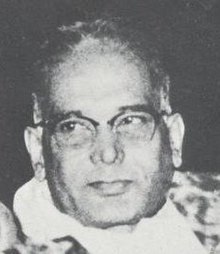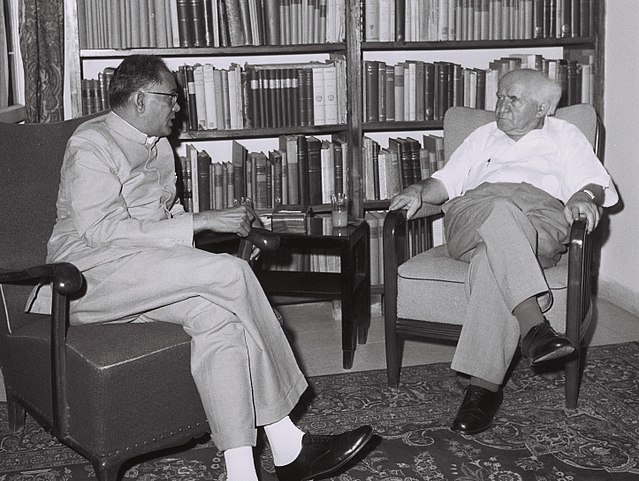Remove ads
Jayaprakash Narayan Srivastava (ⓘ; 11 October 1902 – 8 October 1979), also known as JP and Lok Nayak (Hindi for "People's leader"), was an Indian politician, theorist and independence activist. He is mainly remembered for leading the mid-1970s opposition against Prime Minister Indira Gandhi and calling for her overthrow in a "total revolution". In 1999, Narayan was posthumously awarded the Bharat Ratna, India's highest civilian award, in recognition of his social service. His other awards include the Magsaysay award for public service in 1965.
Jayaprakash Narayan | |
|---|---|
 | |
| Born | Jayaprakash Narayan Srivastava 11 October 1902 Sitab Diara, Chhapra district, Bengal Presidency, British India (now in Ballia district, Uttar Pradesh, India)[1] |
| Died | 8 October 1979 (aged 76) Patna, Bihar, India |
| Other names | JP, Jay Prakash Narayan, Lok Nayak |
| Alma mater | University of Wisconsin (M.A., sociology) Ohio State University (B. A., behavioural science) University of Iowa (CHE, discontinued) U.C. Berkeley (chemistry, discontinued)[2][3] |
| Occupations |
|
| Political party | Indian National Congress Janata Party |
| Movement | Quit India, Sarvodaya, JP Movement |
| Spouse | Prabhavati Devi |
| Relatives | Brajkishore Prasad (father-in-law) |
| Awards |
|
Remove ads
Jayprakash Narayan Srivastava was born on 11 October 1902[4][5] in the village of Sitabdiara, Saran district, Bengal Presidency, British India (present-day Ballia district, Uttar Pradesh, India).[1] [a] His house was near the banks of the flood-prone Ghaghara river; every time the river swelled, the house would be slightly damaged, eventually forcing the family to move a few kilometres away to a settlement that is now known as Jayprakash Nagar, Uttar Pradesh.[citation needed]
Narayan came from a Srivastava Kayastha family.[7][5] He was the fourth child of Harsu Dayal and Phul Rani Devi. His father was a junior official in the canal department of the state government and often toured the region. When Narayan was nine years old, he left his village to enroll in the seventh class of the collegiate school at Patna.[8] This was his first break from village life. Narayan stayed at Saraswati Bhawan, a student hostel in which most of the boys were older than him and included some of Bihar's future leaders, such as its first chief minister Krishna Singh, his deputy Anugrah Narayan Sinha and several others who became politicians and academics.[9]
In October 1918, Narayan married Braj Kishore Prasad's elder daughter and independence activist Prabhavati Devi.[10] After their wedding, because Narayan was working in Patna and it was difficult for his wife to stay with him, Mahatma Gandhi invited Prabhavati to become an inmate at Sabarmati Ashram (Ahmedabad).[11] Jayaprakash, along with some friends, went to listen to Maulana Abul Kalam Azad speak about Gandhi's non-cooperation movement against the passing of the Rowlatt Act of 1919. Azad was a brilliant orator and his call to give up English education was "like leaves before a storm: Jayaprakash was swept away and momentarily lifted up to the skies. That brief experience of soaring up with the winds of a great idea left imprints on his inner being".[citation needed] Inspired by Azad's words, Jayaprakash left Bihar National College with just 20 days remaining to his examinations. Jayaprakash joined the Bihar Vidyapeeth, a college founded by Rajendra Prasad, and became among the first students of Gandhian Anugraha Narayan Sinha.[citation needed]
Remove ads
After exhausting the courses at the Vidyapeeth, Narayan decided to continue his studies in the United States.[10] At age 20, Jayaprakash sailed aboard the cargo ship Janus while Prabhavati remained at Sabarmati. Jayaprakash reached California on 8 October 1922 and was admitted to University of California, Berkeley (UC Berkeley) in January 1923.[12] To pay for his education, Narayan picked grapes, packed fruits at a canning factory, washed dishes, and worked as a garage mechanic and at a slaughterhouse, sold lotions and taught. These jobs gave Narayan an insight into the difficulties of the working class.[2][3]
After a semester studying chemistry[13] at UC Berkeley, his fees doubled and Narayan was forced to transfer to The University of Iowa and later to other universities. He pursued his favourite subject, sociology, and received much help from Professor Edward A. Ross.[citation needed]
In Wisconsin, Narayan was introduced to Karl Marx's book Das Kapital. News of the success of the Bolsheviks in the Russian Civil War made Narayan conclude Marxism was the way to alleviate the suffering of the masses. He studied books by Indian intellectual and Communist theoretician M. N. Roy. Narayan's paper on sociology Cultural Variation[14] was declared the best of the year.[15] Narayan graduated from University of Wisconsin with a MA in Sociology, and from Ohio State University with a BA in behavioural science.[2][3] While in the United States, he met K. B. Menon, then teaching at Harvard, ultimately persuading him to return to India and join the independence movement there.[16]
Remove ads

Having become a Marxist, Narayan returned from the US to India in late 1929.[17] The same year, he joined the Indian National Congress (INC or Congress) on the invitation of Jawaharlal Nehru; Mahatma Gandhi became Narayan's mentor in the Congress. Narayan shared a house at Kadam Kuan in Patna with his close friend and nationalist Ganga Sharan Singh (Sinha)[18] with whom he shared a lasting friendship.[18]
After being jailed in 1930 for civil disobedience against British rule, Narayan was imprisoned in Nasik Jail, where he met Rammanohar Lohia, Minoo Masani, Achyut Patwardhan, Asoka Mehta, Basawon Singh, Yusuf Desai, C K Narayanaswami and other national leaders. After his release, the Congress Socialist Party (CSP), a left-wing group within the Congress, was formed with Acharya Narendra Deva as president and Narayan as general secretary.[citation needed]
When Mahatma Gandhi launched the Quit India Movement in August 1942, Narayan, along with Yogendra Shukla, Suraj Narayan Singh, Gulab Chand Gupta, Pandit Ramnandan Mishra, Shaligram Singh and Shyam Barthwar, scaled the wall of Hazaribagh Central Jail with a goal of starting an underground movement for freedom.[19] Many young socialist leaders like Rammanohar Lohia, Chhotubhai Puranik and Aruna Asaf Ali took part in the movement. Because Narayan was ill, Yogendra Shukla walked to Gaya with Narayan on his shoulders,[19] a distance of about 124 km (77 mi).[20] Narayan also served as the[21] chairman of Anugrah Smarak Nidhi (Anugrah Narayan Memorial Fund).
Remove ads
Between 1947 and 1953, Jayaprakash Narayan was President of All India Railwaymen's Federation, the largest labour union in Indian Railways.[22]
In 1975, Allahabad High Court found Indira Gandhi guilty of violating electoral laws.[23][24][25][26] Narayan called for Gandhi and the CMs to resign, and the military and police to disregard unconstitutional and immoral orders.[citation needed] He advocated a program of social transformation, which he termed Sampoorna kraanti (total revolution).[citation needed] Immediately afterwards, Gandhi proclaimed a national Emergency on the midnight of 25 June 1975.[27] Desai, opposition leaders, and dissenting members of Gandhi's own party were arrested that day.[28]
Jayaprakash Narayan gathered a crowd of 100,000 people at Ramlila grounds and recited Rashtrakavi Ramdhari Singh 'Dinkar''s poem Singhasan Khaali Karo Ke Janata Aaati Hai.[29]
Narayan was detained at Chandigarh; he asked for one month parole to mobilise relief in flooded parts of Bihar. His health suddenly deteriorated on 24 October 1975, and he was released on 12 November the same year.[citation needed] At Jaslok Hospital, Bombay, Narayan was diagnosed with kidney failure; he would be on kidney dialysis for the rest of his life.[citation needed]
In the UK, Surur Hoda launched "Free JP", a campaign for the release of Jayaprakash Narayan that was chaired by Nobel Peace Prize winner Philip Noel-Baker.[30]
On 18 January 1977, Indira Gandhi revoked the emergency and announced elections. The Janata Party, a vehicle for the broad spectrum of the opposition to Gandhi, was formed under JP's guidance.[citation needed] The Janata Party was voted into power and became the first non-Congress party to form a central government.[31] In the 1977 Indian presidential election, Narayan was proposed as President of India by Janata Party leaders but he refused and Neelam Sanjiva Reddy, then Speaker of the Lok Sabha, became president.[citation needed]
Remove ads
At the age of 17, Jayaprakash was married to Prabhavati Devi, daughter of lawyer and nationalist Brij Kishore Prasad in October 1919. Prabhavati was very independent and on Gandhi's invitation, went to stay at his ashram while Jayaprakash continued his studies.[32] Prabhavati Devi died on 15 April 1973 after a long battle with cancer.[citation needed]
In March 1979, while he was in hospital, Narayan's death was erroneously announced by the Indian prime minister Morarji Desai, causing a wave of national mourning, including the suspension of parliament and regular radio broadcasting, and the closure of schools and shops. When he was told about the mistake a few weeks later, Narayan smiled.[33] Narayan died in Patna, Bihar,[34] on 8 October 1979, three days before his 77th birthday, due to effects of diabetes and heart disease.[citation needed]
Remove ads

- Bharat Ratna, 1999 (Posthumous) for Public Affairs: It is India's highest civilian award.[35]
- Rashtrabhushan Award of FIE Foundation, Ichalkaranji[32]
- Ramon Magsaysay Award, 1965 for Public Service.

- Jay Prakash Narayan Airport in Patna
- On 1 August 2015, the Chhapra-Delhi-Chhapra Weekly Express was renamed as Loknayak Express in his honour.[36]
- JP Setu the Digha-Sonpur Bridge, a rail-road bridge across river Ganga in Bihar
- Jayaprakash Nagar (JP Nagar) a residential area in Bangalore.
- Jayaprakash Nagar (JP Nagar) a residential area in Mysore.
- Lok Nayak Hospital (hospital in New Delhi)
- Lok Nayak Jayaprakash Narayan National Institute of Criminology & Forensic Science (college in New Delhi)
- Prakash Jha directed a 112-minute film "Loknayak", based on the life of Jaya Prakash Narayan (JP).[37][38] Chetan Pandit played the role of JP in that film.[39]
- Achyut Potdar played role of JP in ABP News show Pradhanmantri (TV Series) and Aaj Tak Aandolan.
Wikiwand in your browser!
Seamless Wikipedia browsing. On steroids.
Every time you click a link to Wikipedia, Wiktionary or Wikiquote in your browser's search results, it will show the modern Wikiwand interface.
Wikiwand extension is a five stars, simple, with minimum permission required to keep your browsing private, safe and transparent.
Remove ads